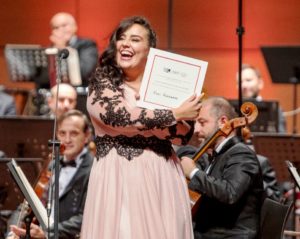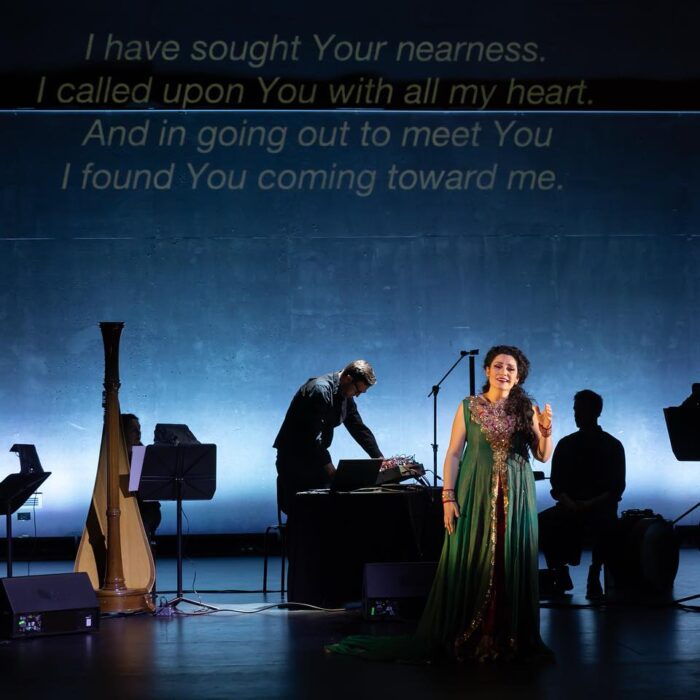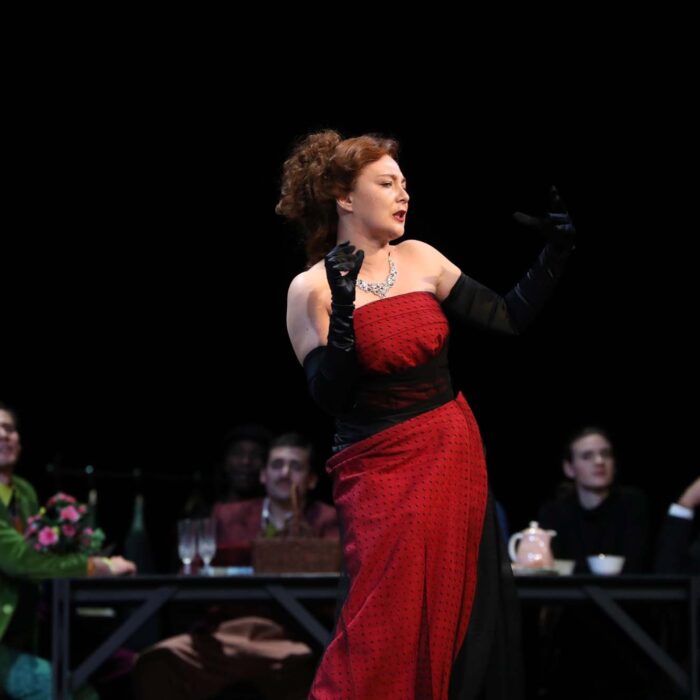
Analysis: 2018 Leyla Gencer Voice Competition Istanbul
In Ezgi Karakaya, Another Turkish Singer Carries On The Legend of ‘La Diva Turca’
By Jonathan SutherlandOpera aficionados d’un certain âge remember Leyla Gencer with almost idolatrous admiration and no small degree of reverence. With the passing of time, most younger devotees of the lyric theatre have about as much knowledge of “La Diva Turca” as they do Maria Reining or Toti dal Monte.
Born Ayshe Leyla Ceyrekgil in Istanbul sometime between 1918-1928, Gencer enjoyed a tremendous operatic and concert career spanning more than 35 years. When she died in 2008, Michel Parouty wrote in Opéra: “She was the last diva of the 20th century, an embodiment of perfection.” Not a bad valediction.
The Diva at a Glance
Despite being a sell-out name at La Scala, La Fenice, San Carlo, Teatro Massimo and acclaimed across Europe from Lisbon to Oslo, Gencer never sang at the Metropolitan. She made her American debut in San Francisco in 1956 with “Francesca da Rimini” which inaugurated the War Memorial Opera House. She returned to Kurt Herbert Adlerland on a regular basis and was also a popular guest artist in Chicago, Los Angeles, Philadelphia and Dallas.
Reputedly, a rancorous Rudolf Bing never forgave Gencer for making her US debut in San Francisco rather than the Met and apart from a rare concert performance of “Caterina Cornaro” in Carnegie Hall, New Yorkers never got to hear this incomparable artist in the Big Apple. The closest Gencer got to an opera stage in Manhattan was actually New Jersey where she sang “Attila” in 1972.
As she also made very few commercial recordings, her name is not nearly as well remembered as contemporaries such as Callas, Tebaldi, Milanov, Nilsson, Price or Caballé. Gencer was actually far more adventurous in repertoire selection than any of the aforementioned divas in that she sung 72 roles ranging from predictable parts like Violetta or Aida to real rarities such as Spontini’s “Agnese di Hohenstaufen” and “Medea in Corinto” by Simon Mayr. She also sang in the world premières of Pizzetti’s “Assassininio nella cattedrale” in 1958 and Poulenc’s “Dialogues des Carmélites” in 1957 – both at La Scala.
She could sing coloratura, lyric and spinto roles with a similarly flawless technique and commensurate dramatic prowess. In many ways, Gencer was a composite of both Callas and Tebaldi, but with a glamour and artistic integrity all her own. The exotic Turkish soprano quickly developed an adoring and demonstrative fan base, especially in Milan where the passionate loggionisti would tolerate no criticism of La Diva Turca. Renowned British music critic Andrew Porter once wrote a negative review about La Leyla and according to William Braun in Opera News, an unfortunate doppelgänger was physically assaulted at La Scala shortly after, despite the innocent victim wailing “I am not Andrew Porter, I am not Andrew Porter!!!”
In a world full of explosive egos and prima donna paranoia, Gencer was remarkably generous of spirit. During an interview on RAI in 1979 as quoted in Franca Cella’s recently translated biography, when she was asked about “Norma,” Gencer replied: “It is useless for me to speak about my Norma when we have Maria Callas’ incomparable one. Let’s listen to it instead.”
While Gencer’s exact date of birth remains a mystery, there is no ambivalence about her dedication to helping young singers, not only during her own extensive career, but after her last official operatic performance in 1983 at La Fenice. Typically for Gencer, she didn’t drag out an old war-horse role for her swansong but left the operatic stage with an impossibly esoteric work, “Priva d’un’opera seria” by Francesco Gnecco. Fortunately, many years of concerts followed.
Riccardo Muti invited Gencer to be Artistic Director of the first Teatro alla Scala Academy in 1997 but perhaps even more important for a singer with Turkish and Polish roots was the eponymous Leyla Gencer Voice Competition which was inaugurated in Istanbul in 1995. Gencer was actively involved in the competition until her death 13 years later and the event is now under the auspices of the Istanbul Foundation for Culture and Arts (IKSV), the Borusan Sanat orchestra and the Accademia Teatro alla Scala.
The Competition
Forty applicants are selected from preliminary auditions in several cities in Europe and then reduced to nine finalists. At this year’s Competition, an impressive international jury was headed by the incomparable Italian baritone Renato Bruson who actually first sang with Gencer at the San Carlo in 1972 in Alberto Fassini’s staged production of “Caterina Cornaro”. Previous winners of the competition include Pretty Yende, Anita Rachvelishvili, and Marcello Álvarez, all of whom went on to enjoy important operatic careers.
Five nationalities were represented in the finals: South Korea (1), Poland (1), Germany (1) Italy (2) and Turkey (4). Only one member of the Jury, Professor Yekta Kara Taygun from the Mimar Sinan Fine Arts University was Turkish, ensuring the judging panel was refreshingly free of local bias. David Gowland from the Royal Opera House Jette Parker Young Artists Programme gave a Special Award of a four-month training programme in London to Turkish baritone Faik Mansuroğlu and Christoph Seuferle, Director of the Deutsche Oper Berlin, presented another Special Award to Turkish bass-baritone Doğukan Özkan which permits him to take part in one of the Deutsch Oper’s forthcoming productions. Teatro alla Scala casting director Toni Gradsack gave a similar Award of a three-month scholarship to Polish tenor Piotr Buszewski who was also awarded Third Prize.
The Winers
Buszewski won the Mario Lanza Competition in Filignano last year and has a particularly bright, forward placed voice reminiscent in timbre of a young Luigi Alva or Francisco Araiza. Only 25, Buszewski already has a solid technique, inherent musicality, and admirably sensitive phrasing. His selection of “La donna è mobile” was perhaps too obvious a crowd pleaser, but had the bonus of effervescent enthusiasm with Lothario-ish good looks. This was less a cynical libido-overdosed Duca than an attractive young man with a dolce far niente view about le donne. The aria is marked “allegretto” but conductor Pietro Miantini led the Borusan Istanbul Philharmonic Orchestra with dubious brio. More alarmingly, the musicians were often slightly behind the singer.
Buszewski paid impeccable attention to the score, with the legato diminuendo on “muta d’accento” and “in pianto o in riso” sung precisely as indicated. There was an excellent crescendo on the second “muta d’accento” leading to a deliciously leggere “e di pensier” and the four bar F sharp fermata had a Pavarotti-ish ping with a similarly refulgent crescendo and con forza conclusion. During the da capo there was a stirring G-sharp fortissimo fermata on “d’accento” and the concluding high B natural showed solid spinto strength with a commanding squillo. Perhaps the acciaccature could have been slightly crisper but the overall interpretation was original and eloquent. Buszewski is a tenor to watch.
2nd Place
The Second Prize winner was Italian mezzo Anna-Doris Capitelli who selected another predictable crowd-pleaser cavatina, “Una voce poco fa.” Considering the role of Rosina has been sung by such authorative mezzos as Teresa Berganza, Cecilia Bartoli and Joyce DiDonato, it is difficult to impose an individual interpretation on this capricious piece of Rossini rompery. Cesare Sterbini’s libretto was greatly admired by the composer from Pesaro and the witty text demands absolutely crystalline diction. As a native Italian speaker, Capitelli was more or less a casa sua but the double consonants on words such as “toccano,” “rispettosa” and “trappole” could have been better articulated.
This is a young singer with a dependably secure technique and the fiorature passages and runs were particular pristine. The top G sharps were strong without being pushed and there were some tasteful Rossinian embellishments and interpolations reaching top B. An extemporized fermata/cadenza on “giocar” was impressive and the a piacere upward/downward scales and runs had bite and bravura. Capitlli has strong projection and a plumy timbre in the mid voice but deeper chest notes need work. The low G sharps on “sarò” for example were more proximate than potent à la Horne.
Word coloring was a bit monochromatic. The way Callas almost flicked “ma” for example is worthy of emulation. Similarly, “sarò una vipera” had no sting at all. Dynamic markings were not always exact with “Io sono docile” sung closer to mezzo forte than the indicated piano. The quavers on “Ma, ma se mi toccano” were inexplicably rushed as was “E cento trappole”. The concluding top B on “farò” had plenty of punch and was a predictable audience pleaser.
The Winner
The winner of the competition was local mezzo Ezgi Karakaya who also bagged a special award from the Borusan Istanbul Philharmonic Orchestra as well as the Audience Prize. Her choice of Donizetti’s “La Favorita” was rather brave as it is hardly the best known of the king of bel canto’s prodigious output.
But in this case Karakaya’s selection of “O mio Fernando” was favorite both in name and numbers. This is a great set piece for the doomed heroine Leonora di Gusmann and requires considerable dramatic skills as well as exemplary legato singing. Karakaya excelled in both. For once orchestral tempi were not so sluggish and maestro Miantini led a spirited allegro agitato introduction to the “Fia dunque vero, oh ciel?” recitative. The change to lento on “Tutto mel dice” displayed Karakaya’s caramel-coloured mid-voice, dropping to a Resnik-rich low B natural on “estrema!”
The only reservation was that her diction was less than stellar. Some dulcet harp arpeggios and slightly edgy horn playing led to the cantabile aria proper and the Turkish mezzo displayed a formidable evenness of tone, treacle timbre and outstanding breath control. Slurs were artfully observed. Again the low B naturals were sepulchral but an attempted high F fermata on “dispegio” was cut short by Miantini for some reason. There was a stylish embellishment on “allor fia scemo” and the change to the moderato mosso quasi-cabaletta at “Scritto è in cielo il mio dolor!” was rightly resoluto but curiously the opening piano dynamic was overlooked.
After the winners were announced, Karakaya repeated the aria, understandably more relaxed and confident. This is a role made famous by great mezzos of yore such as Ebe Stignani, Giulietta Simionato, and Fedora Barbieri and on the basis of this performance, young Ezgi Karakaya could well be “La Favorita” for the 21st century. With improved diction and more varied word coloring, she will undoubtedly have an impressive career.
La Diva Turca would have been well pleased.
Categories
Special Features

